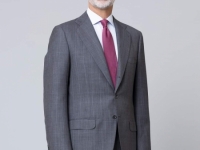Politics
The King of Spain renounces his inheritance
He breaks relationships with his father
USPA NEWS -
King Felipe VI of Spain has renounced the inheritance of his father, King Emeritus Juan Carlos I, who has withdrawn the assignment he received from the State budget. As reported this Sunday by the Royal Household, the decision is a consequence of the alleged funds that the emeritus monarch would have in tax havens and that would come from commissions paid by Saudi Arabia for the contract for the construction of the high-speed train (AVE) to Mecca. The Swiss Prosecutor's Office investigates these alleged payments.
For the second time since he entered the throne, King Felipe VI has decided to break relations with a member of his family. First, he went to her sister, Infanta Cristina, for her husband's illicit business, for which he is serving a sentence in a Spanish prison. Now it is with his father, King Emeritus Juan Carlos I, whom the Swiss Prosecutor's Office is investigating for, allegedly, having received almost 111 million US Dollars from Saudi Arabia as a donation for the contract for the construction of the AVE to Mecca. Of that amount, 100 million US Dollars (65 million Euros) would have been given to the German princess Corinna zu Sayn-Wittgenstein. King Felipe VI appears as the second beneficiary of the account of the offshore foundation - Lucum Foundation - which received the alleged donation.
The statement from the Spanish Royal Household informs that King Felipe VI "renounces the inheritance of Don Juan Carlos that may personally correspond to him, as well as any asset, investment or financial structure whose origin, characteristics or purpose may not be in line with the legality or with the criteria of rectitude and integrity that govern its institutional and private activity and that must inform the activity of the Crown.“ In addition, the King withdraws from his father the economic allowance that he received from the State budget.
The monarch claims to be unaware of his designation as second beneficiary of the Lucum Foundation. "By letter dated March 5, 2019, addressed to the House of H.M. the King through the law firm Kobre & Kim (UK), H.M. the King was informed - without any documentary justification - of his alleged designation as beneficiary of the Lucum Foundation,“ from the moment of the death of H.M. the King Juan Carlos,“ indicates the statement from the Royal Household. On March 21, 2019, the King communicated to the Lucum Foundation that “neither His Majesty nor His House had any knowledge, participation or responsibility whatsoever in the alleged events that he mentioned - for which there was no legal justification for his involvement in them -, nor would it appoint a legal representative to initiate any negotiation with the aforementioned law firm on the events described.“
Subsequently, on April 12, 2019, the King appeared before a notary "to state that he has addressed a letter to his father, the King Juan Carlos, so that if his appointment or that of the Princess of Asturias as beneficiaries of the aforementioned Lucum Foundation, will annul such designation, also stating that it would not accept any participation or benefit in that entity, also renouncing any right, expectation or interest that, even without its consent or knowledge, may correspond to them now or in the future in relationship with the Lucum Foundation.“
In the same act, Felipe VI "stated that he had no knowledge or consent to participate, on his own behalf or on behalf of third parties, particularly his daughter, in any asset, investment or financial structure whose origin, characteristics or purpose may not be in full and strict accordance with the law or with the criteria of transparency, integrity and exemplary that inform its institutional and private activity.“
King Juan Carlos I abdicated in June 2014 and, five years later, on May 27, 2019, he announced that he was leaving institutional activity, withdrawing completely from public life.
Liability for this article lies with the author, who also holds the copyright. Editorial content from USPA may be quoted on other websites as long as the quote comprises no more than 5% of the entire text, is marked as such and the source is named (via hyperlink).






